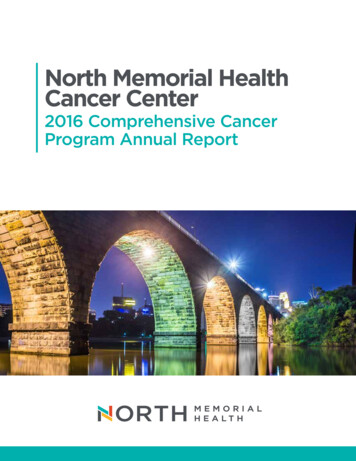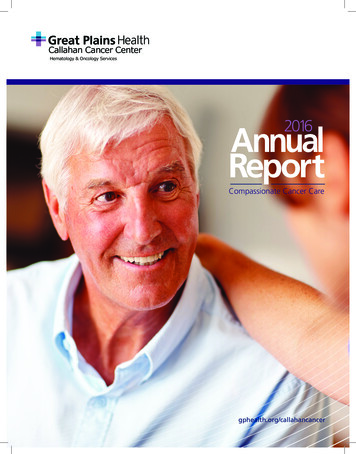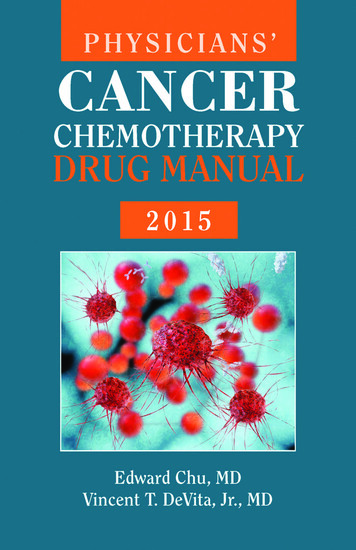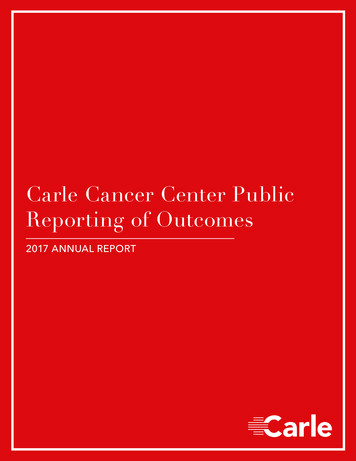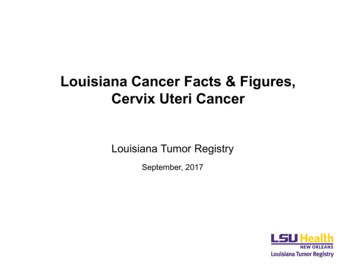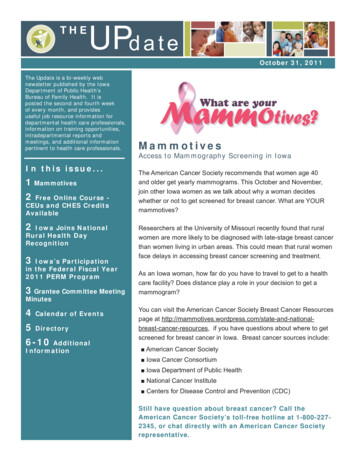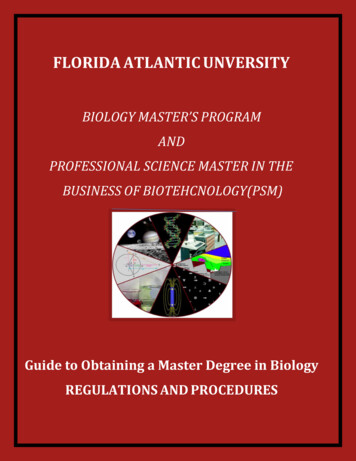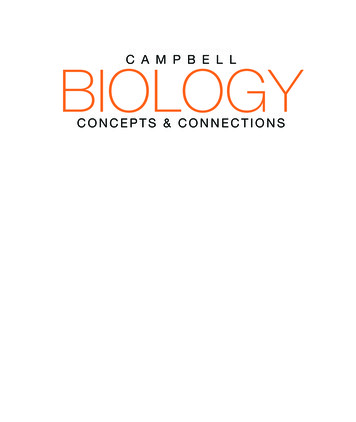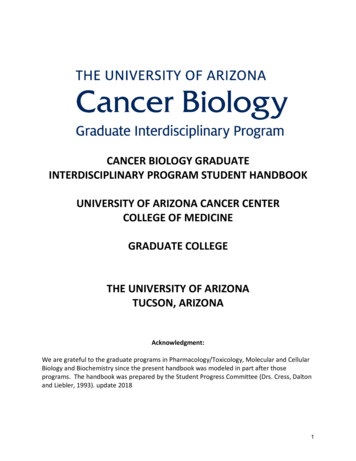
Transcription
CANCER BIOLOGY GRADUATEINTERDISCIPLINARY PROGRAM STUDENT HANDBOOKUNIVERSITY OF ARIZONA CANCER CENTERCOLLEGE OF MEDICINEGRADUATE COLLEGETHE UNIVERSITY OF ARIZONATUCSON, ARIZONAAcknowledgment:We are grateful to the graduate programs in Pharmacology/Toxicology, Molecular and CellularBiology and Biochemistry since the present handbook was modeled in part after thoseprograms. The handbook was prepared by the Student Progress Committee (Drs. Cress, Daltonand Liebler, 1993). update 20181
TABLE OF CONTENTSINTRODUCTION6BACKGROUND6STUDENT RESPONSIBILITIES6ORGANIZATION7Philosophy and Goals7Administration7Executive Committee8Graduate Student Representation8Financial Support8Participating Faculty Research8RESOURCES AND FACILITIES9Laboratory Space9Equipment Resources9Library Resources9Research involving human subjects or live vertebrate animals10Laboratory Safety and Environmental Health10CBIO DOCTORAL PROGRAM11Orientation11Curriculum and SupervisionA. Program Course InfoB. Research Advisor and Advisory CommitteeC. Student EvaluationD. Comprehensive Exam and Advancement to CandidacyE. DissertationF. Final ExaminationG. Limitation on Time to Fulfill Degree Requirements:H. Requirements for Minor DegreeI. Scientific MeetingsJ. Master's Degree Option for Ph.D. Students11111415151717181818182
PH.D. TIMETABLE20GUIDELINES FOR RESEARCH PROPOSAL PREPARATION22SAMPLE OF A DISSERTATION OUTLINE23FORM: REPORT OF STUDENT SUPERVISORY COMMITTEE MEETING243
To the Student:This handbook outlines the philosophy and requirements of the Graduate Degree offered in thediscipline of Cancer Biology at The University of Arizona. It is intended to be used tounderstand and fulfill the requirements for your graduate degree, in conjunction with thecurrent Graduate College requirements. The requirements of the Interdisciplinary Program inCancer Biology outlined herein are under the authority and consistent with the rules andguidelines set forth by the Graduate Council of the U of A Certain general Universityregulations and specific Cancer Biology program degree requirements are only outlined in thisdocument; you are urged to consult the current Graduate Catalogue viahttp://grad.arizona.edu/ for complete details.Attainment of the degree of Doctor of Philosophy with a major in Cancer Biology requiresoutstanding scholarship, a demonstration of a depth and breadth of knowledge anddemonstration of the design and execution of original research leading to a dissertation thatcontributes significantly to the general fund of knowledge in the discipline. The degree is nevergranted solely as certification of faithful performance of a prescribed program of studies. Alldegree requirements must be fulfilled.It is the responsibility of students to familiarize themselves with the general campus-widerequirements and information on transfer of graduate credit from other institutions, offcampusgraduate study, scholastic standards, forms that the student must submit to the GraduateCollege, and the time limit for the completion of requirements for graduate degrees.The Graduate College https://grad.arizona.edu/ is your main source for academic policies, andacademic integrity.Resources for parents, for professional development, for health and wellness, parental leave,etc: http://grad.arizona.edu/new-and-current-students4
The University of Arizona is an EEO/AA Employer and does not discriminate on the basis of sex,race, religion, color, national origin, Vietnam Era Veterans' status, or handicapping condition inits admissions, employment and educational programs or activities.5
INTRODUCTIONThe University of Arizona offers an interdisciplinary graduate program in Cancer Biology leadingto the Ph.D. degree with a major in Cancer Biology. Students in this program may choose areasof special concentration such as biochemistry, molecular and cellular biology, pharmacology orimmunobiology. Students may also choose from disciplines such as biochemistry, molecularbiology, pathology and toxicology as areas of study toward the minor.BACKGROUNDCancer Biology is a scientific discipline concerned with investigating the regulation of normaland neoplastic cell growth. These studies range in scope from understanding the regulation ofDNA transcription, replication and repair to molecular events regulating tumor progression. Theability of cancer biologists to elucidate basic mechanisms of cellular transformation andmolecular events in tumor progression has been applied toward the improved diagnosis,treatment and prevention of cancer. In addition, cancer biologists have contributed toward theunderstanding of basic mechanisms of growth control which can be universally applied to otherdisciplines such as developmental biology, virology, immunology and genetics.The need for specialized training in the area of Cancer Biology is evidenced by the increasedneed for highly trained professional personnel (Ph.D., M.D.-Ph.D. degrees). This need isreflected in the number of positions available in research/teaching/service areas of healthprofessional schools (human and veterinary medicine, pharmacy, dentistry), university graduateand undergraduate programs, pharmaceutical and chemical industries, hospitals, and state andfederal government research and regulatory agencies.The Graduate Program in Cancer Biology at the University of Arizona is oriented towardsmodern molecular and cellular biology and biochemistry, especially in those areas dealing withmechanisms of cellular growth control and neoplastic transformation. Emphasis is placed onthe physiological, biochemical and molecular mechanisms of action. Current research by theparticipating faculty members in the Program include but are not limited to investigations inthe fields of DNA replication and transcription, molecular genetics, membrane-cytoskeletalinteractions, cancer imaging and chemical carcinogenesis.STUDENT RESPONSIBILITIESThe program in Cancer Biology stresses to the student the following issues:1. Students earn a degree based upon the depth and breadth of their knowledge in the field ofcancer biology and their ability to generate and defend an original research proposal. It isexpected that research findings will be published as a peer-reviewed manuscript2. Students are to conduct their experiments in an ethical manner. Experimental fraud relatedto the creation of false data or the unethical theft of others' work will not be tolerated.Students should keep their data in a format acceptable to the research advisor and be prepared6
to turn over their records to the Graduate Program at any time. The student is expected tocomplete the required and elective coursework in a timely manner.Via GradPath, you will certify that you are aware of Responsible Conduct of ResearchCompliance regulations and Academic integrity requirements and will adhere to them in yourresearch.Responsible Conduct of Research: http://www.orcr.arizona.edu/Academic integrity: tegrityORGANIZATIONPhilosophy and GoalsThe major objective of the Cancer Biology Graduate Interdisciplinary Program is to admit andtrain doctoral candidates and postdoctoral fellows who have the potential to becomeindependent research scientists in various areas of cancer biology. It is also expected thatgraduates of the program will have an opportunity to acquire effective teaching skills.Evaluation of student performance is the responsibility of individual faculty members andsupervisory committees.Graduate students in the Cancer Biology program will:1. Be able to think critically and think independently.2. Be able to define key questions in cancer biology that require investigation.3. Learn to communicate effectively in both the written and oral forms.4. Develop an awareness of and skill in current and modern technologies.5. Develop a comprehensive awareness of treatment and management modalities for cancer.6. Acquire the professional skills necessary for a career in academia or industry.AdministrationThe Cancer Biology Graduate Interdisciplinary Program has participating faculty from severaldepartments including the departments of Basic Medical Sciences (Phoenix), BiomedicalEngineering, Cellular and Molecular Medicine, Chemistry and Biochemistry, Medicine,Immunobiology, Molecular and Cellular Biology, Nutritional Sciences, Pathology, Pharmacology,Pharmacology and Toxicology, Pediatrics, and Surgery. All graduates of the Ph.D. programreceive a Ph.D. in Cancer Biology. Several committees participate in the administration of thegraduate program.7
Executive CommitteeThe Executive Committee consists of eight faculty members, a graduate student representativeand a postdoctoral Cancer Biology T32 training grant trainee. Faculty members of the ExecutiveCommittee may serve a four-year term and the terms are staggered so two members of theExecutive Committee are replaced every year. New members of the Executive Committee areappointed by the Faculty Director of Graduate Interdisciplinary Programs based onrecommendations from the Executive Committee. Faculty members of the ExecutiveCommittee may serve a maximum of three consecutive terms. The student member, who musthave passed the comprehensive exam, serves a one-year term and is elected by the students inthe graduate program. The postdoctoral trainee is selected by the Chair of the program.The chairperson of the executive committee is appointed by the Director of GraduateInterdisciplinary Programs based on a candidate selected by a vote of the entire faculty of theCancer Biology Graduate Interdisciplinary Program. Nominations for the chair position will beaccepted from any member of the committee.Graduate Student RepresentationEach year one graduate student representative from the Ph.D. program is elected by thegraduate students in the Cancer Biology program for a term beginning in August and ending thefollowing July. The graduate representative must have passed their comprehensive exam toserve. This position serves as an official liaison between the students and faculty of theprogram. The representative is responsible for organizing graduate student participation ingraduate program endeavors (such as the practice comprehensive exams), as well as serving onProgram committees in an advisory capacity. Each student should seriously consider his/herchoice for the graduate student representative in order to maintain an effective student voicein graduate program issues.Financial SupportFinancial assistance in the form of research assistantships is available to all students admittedinto the program. Support in the first year in the program after completing the initial year inthe Arizona Biological and Biomedical Sciences Program may be provided through a fellowshipor research assistant appointment. Later, support will be in the form of research assistantships,a trainee fellowship or donated funds. Outstanding students are also encouraged to apply forindividual predoctoral fellowships from sources outside the University. Graduate researchassistant appointments provide a waiver of tuition and student-only health insurance.Participating Faculty Research8
For the most up to date list of faculty participating in the Program, visithttp://www.cancerbiology.arizona.eduRESOURCES AND FACILITIESLaboratory SpaceLaboratory space is available within the separate departments represented by the participatingfaculty. The laboratory resources available are listed in literature available from thosedepartments. There are affiliated laboratories at the Main campus of the University of Arizona,Arizona Cancer Center, Arizona Health Sciences Center, University of Arizona Medical Center,the College of Pharmacy and the UA College of Medicine Phoenix campus.Equipment ResourcesAvailability of modern scientific instruments is crucially important to research and graduateeducation programs. Sufficient instrumentation is available to conduct research with amolecular biology, biochemistry and/or cell biology emphasis.For example, the laboratories in the University of Arizona Cancer Center contain instrumentsnecessary for biological analysis, including spectrophotometers, high performance liquidchromatographs, and FPLC machines and equipment necessary for protein and DNA analysis. Alllaboratories have access to modern computers and data processing systems. Each laboratory isequipped with specialized instrumentation required for research in its particular field. Inaddition to individual research laboratories, shared laboratory space includes a tissue culturefacility, an experimental irradiator, an equipment room containing centrifuges,spectrophotometers, electroporators and thermocyclers. A shared resources directory of theArizona Cancer Center is available at http://www.uacc.arizona.edu/ and describes in detail corefacilities which include cell culture, cytogenetics, flow cytometry, biometry, research pharmacyand a P3 biohazard facility.Library ResourcesThe University of Arizona takes pride in the outstanding quality of its libraries. The GeneralLibrary and the Science Library, both on the main campus, hold extensive collections of generaland scientific periodicals and books. The Arizona Health Sciences Library, located in the Collegeof Medicine, is readily available to graduate students in Cancer Biology 24 hours a day. Inaddition to its holdings of pertinent periodicals and books, the library provides access to mostscience-related journals through the internet.9
Research involving human subjects or live vertebrate animalsResearch involving human subjects or live vertebrate animals requires permission from therelevant University committee. Consult your research director and the Office for theResponsible Conduct of Research for details.Research activities involving the use of human subjects requires the review and approval of theUniversity Human Subjects Committee. A copy of the Human Subjects approval letter alongwith the Human Subjects Research Statement must be in the student's file in the office of theCancer Biology Program. The student’s advisor confirms to the Graduate College in GradPaththat the student is following the Responsible Conduct of Research regulations.Research involving any live vertebrate animals must be approved by the Institutional AnimalCare and Use Committee (IACUC). The Animal Research Protocol Review form must becompleted by the student/instructor and submitted to the protocol office for review andapproval. Contact University Animal Care for instructions, forms and protocol.Laboratory Safety and Environmental HealthIt is the responsibility of all personnel involved in scientific study to be aware of the safetyprecautions and the proper disposal of hazardous wastes specific to the research effort. Thestudent has an obligation to not only be familiar with but also follow the specifics of laboratorysafety associated with the desired area of research. The office of Risk Management andLaboratory Safety offers training covering basic laboratory safety, fire prevention, hazardouswaste disposal, compressed gas safety, basic radiation protection, and industrial hygiene, etc.Students are required to attend the laboratory safety and radiation control (if necessary)early in their graduate career. http://risk.arizona.edu/training/ Laboratory directors andtechnicians are the best source for day-to-day laboratory safety techniques and advice onsafety seminars required for laboratory personnel.Requirements for the training in the Responsible Conduct of Research in the Cancer BiologyGIDP are met through required courses such as Science, Society and Ethics. This training isdocumented through GradPath.10
CBIO DOCTORAL PROGRAMOrientationBefore the student’s first full year in the Cancer Biology GIDP, the Chair of the program willconduct an information meeting to discuss the students’ responsibilities and requirements ofthe CBIO GIDP.Curriculum and SupervisionA. Program Course InfoThe student's Major Advisor and Advisory Committee will tailor the coursework to fit specificneeds and objectives. The faculty encourages the student to take advanced courses in cancerbiology, biochemistry, chemistry, molecular and cell biology and to diversify his/her programwith courses in genetics, microbiology, anatomy, pathology, philosophy of science ormathematics.1. Full-Time Enrollment of Graduate StudentsAll full-time students are expected to enroll for a combination of course work and researchand dissertation study that totals 12 units of credit for the Fall and Spring semester. Students who have not completed their comprehensive examination should enroll inCBIO900 (Research, 1-9 units).After completion of the comprehensive examination, students enroll in CBIO 920(Dissertation). Although a maximum of 18 units of 920 may be claimed for credit on astudent's Doctoral Plan of Study, the student may enroll for as many units as needed tocomplete his/her dissertation.Registering for 6 units after completion of all required coursework and fulfillment of requireddissertation units is acceptable and encouraged.11
2. CoursesCancer Biology Required Core CoursesSpring (2 sections available)Fall onlySpring onlyoffered every odd yearRequired each semesterrequired each Fall semesterRequired Responsible Conduct ofResearch course (Spring only)Course number/nameBIOS576A BiostatisticsCBIO552 Cancer BiologyCBIO553 Advanced Topics inCancer BiologyCBIO 561 Clinical ExperienceCBIO 596H Seminar SeriesCBIO 595C ColloquiumMCB 695e Science, Society andEthics orCBIO 595b Scientific Writing,Presentation and BioethicsIMB 521 Scientific GrantsmanshipLab RotationsSpring4 units Fall and Spring semesters aspart of ABBS first year requirementOffered each semester, separateCBIO695a Research conferencesection for each faculty member(lab meeting)Offered each semester, separateCBIO 900 Researchsection for each faculty memberCBIO 920 DissertationSelection of Possible ElectivesCourse number/nameUnits/SemCBIO 515 Mechanisms of Human Disease4/SpringCBIO 524 Contrast Agents, Molecular Imaging and Kinetics3/SpringCBIO 531 Nutrition and Cancer2/SpringCBIO 550 Drug Disposition and Metabolism2/SpringCBIO 595a Oncogenes and Signal Transduction journal club1/FallCBIO 602a General and Systems Toxicology3/FallCBIO630a Cell Communication and Signal Transduction3/SpringCBIO630b Cell Communication and Signal Transduction3/FallCMM 579 Art of Scientific Discovery3/FallCMM 577 Principles of Cell Biology4/FallPCOL 601a Epigenetics in Development and Disease1/FallPHSC 670 Principles in Drug Discovery, Design, Devel.3/FallPLS 539 Methods in Cell Biology and Genomics3/FallUnits peroffering3442111Instructor (S)CBIO FacultyCBIO FacultySchroffCampos agaLimesandHeimarkCherringtonSmithZhangGordonCMM facultyFutscherGalbraithWaiver of Core CoursesWaiver of a core course will be handled on a case by case basis.12
Transfer of CoursesTransfer of a maximum of 30 credits of graduate level coursework is permitted by the Programand the Graduate College contingent upon a copy of an official transcript on file in the GraduateCollege from an accredited college.The Research Advisor and Advisory Committee will help the student plan an educationalprogram in which coursework is completed as quickly as possible. Because of individualinterests or conflicts in scheduling, some formal coursework may extend into the third year ofgraduate study.Incomplete PolicyStudents earning a grade of Incomplete, “I” for a course should submit a completed Report ofIncomplete Grade form to the Cancer Biology GIDP office for inclusion in their academic record.Incomplete grades should be completed in a timely manner and are submitted at the discretionof the course Instructor.Link to incomplete form: grade3. SeminarsSeminars are an important component of the Graduate Program. A weekly seminar series issponsored by the Graduate Program. All students are required to attend.Cancer Biology Seminar Series CBIO596h (Mondays, 9-10 AM, Room 2951, Arizona CancerCenter). These seminars are presented by faculty from within the University or those who comefrom outside the University as guests of participating faculty or students. These seminars arepresented by experienced scientists and consist of an update of recent research in thespeaker's laboratory. Registration is required each semester.Student seminar or presentations. Students in the Graduate Program practice presentationskills to the faculty, fellow students and laboratory personnel through the required CancerBiology Student/Postdoc Research Colloquium (CBIO 595c). Registration is required each Fallsemester.Volunteer Cancer Biology Student Presentations On a regular basis, students have theopportunity to practice their presentation skills, prepare for their comprehensive exam andshare advances in their research before the Cancer Biology students. Practice comprehensiveexams are a part of this student led meeting. The Graduate Representative coordinates thispresentation.4. Laboratory RotationsEach first year student must participate in at least three research laboratory rotations. Theobjective of the required laboratory research rotations is the introduction of the graduate13
student to research and familiarization with the scope and nature of the faculty's researchendeavors. The research laboratory rotation constitutes a major part of the first year graduatecurriculum. Performance criteria to be used by the laboratory director will include assessmentof the student's Understanding of the project, effort, technical ability, record keeping ofexperiments and research presentation(s). Students are expected to devote a minimum of 20hours per week to the laboratory project.Occasionally a student is admitted and has already selected a laboratory to pursue theirresearch interests. The student is still required to complete two lab rotations and shoulddiscuss options with the Director of the Program. These rotations can be used to learn atechnique for use in their dissertation project or to teach a technique in the selectedlaboratory.B. Research Advisor and Advisory CommitteePrior to the selection of a Research Advisor, the student must become familiar with theresearch interests of the faculty. This may be initiated early in the fall semester as the studentmeets individually with the participating faculty whose research is of particular or potentialinterest. A general student advisor is available to counsel the student. Additional familiarity isgained through the laboratory research rotations which occur during the first two semesters.After these preliminary interviews and research laboratory experiences, the student decideswith whom he/she would like to do his/her dissertation research. The student mustcommunicate their selection of a research advisor to the Cancer Biology GIDP office forapproval.At the time of research advisor selection, or shortly thereafter, the supervisory committee isformed. The supervisory committee consists of three members from the program faculty andtwo from the minor field and is chaired by the research advisor. The research advisor discussesmembership of the supervisory committee with the student and recommends the compositionof the committee to the Program Chair. The Student Progress Committee may modify thesupervisory committee membership. Faculty members of the supervisory committee areselected on the basis of their ability to provide useful advice about the research problem, toassist in selection of appropriate coursework, and to help guide the student to successfulcompletion of degree requirements.The supervisory committee will meet with the student at least once each calendar year toreview progress in coursework and research. A report of the supervising committee meetingrecommendation will be completed by the research advisor (see attached form). The studentwill be responsible for giving a private dissertation proposal which will consist of a privateseminar to the advisory committee which will outline the background, preliminary data andgoals of the proposed dissertation topic. The supervisory committee will focus on theobjectives of the proposed dissertation as well as limiting the scope.14
C. Student Evaluation1. CriteriaOn behalf of the program faculty, the Student Progress Committee evaluates each student onthe basis of accomplishments in formal courses and performance in other areas of the program.For example, for first year students the emphasis is placed upon performance in researchlaboratory rotations. In subsequent years, the student's development as a research scientistbecomes of major importance. It is therefore necessary for each student to perform well informal courses, in seminars, and in the research laboratory. Failure to meet performancecriteria in any of these areas is grounds for dismissal from the Program. The Cancer BiologyGIDP Academic Assessment can be viewed http://assessment.arizona.edu/gip/cancer bio2. Grades in Core CoursesAll students must receive a grade of "B" or better in all core courses. A student who receivesa grade of "C" or less in a core course must repeat that course. A student may petition to havethis repeat requirement waived; a waiver can be granted only with the written approval of thecourse instructor and the Student Progress Committee. A grade of "C" or less in a core courseconstitutes grounds for dismissal from the Graduate Program.3. Annual ReportsEach student is required to submit an Annual Report to the Student Progress Committeebefore the end of the Spring Semester. The Annual Report consists of an update of the year’sprogress including coursework, presentations (both oral and poster), travel to scientificmeetings, publications, etc. Completion of an Individual Development Plan is part of theprogress review.D. Comprehensive Exam and Advancement to CandidacyAdvancement to candidacy requires satisfactory completion of the ComprehensiveExamination and the required coursework for the degree. As required courses are completed,usually at the end of the second academic year, the comprehensive examination may bescheduled. The completion of required courses is recommended but is not required to take thecomprehensive exam. Is it the expectation of the program that the ComprehensiveExamination will be completed no later than the end of the third academic year. The studentmay be dismissed from the program if this requirement is not met and the program’s graduatecommittee determines dismissal is warranted. The student will be officially notified of this viamail and e-mail and copied to the Graduate College.The comprehensive examination is considered the single major test of whether or not thestudent is suitable doctorate material.15
1. Comprehensive ExaminationStudents wishing to take the Comprehensive Examination within a given semester shall, withthe approval of their Advisory Committee, submit the required on-line forms through GradPath.The comprehensive examination consists of two parts: The Research Proposal and the OralExaminationResearch ProposalThe first part is a research proposal in an area of Cancer Biology. The topic selected for theresearch proposal must be approved in advance by the Advisory Committee. The researchproposal must be an original work and not a reflection of a research project currently beinginvestigated in the dissertation director’s laboratory. The proposal is prepared in the form of aNational Institutes of Health RO1 grant proposal, F31 or R21. Limit of 12 pages.(Copies of previous student research proposals are available for viewing in the Cancer BiologyProgram office.) The research proposal must detail items 1-4 of the NIH guidelines; informationconcerning a proposed budget, etc. is not required. It must be submitted to the AdvisoryCommittee at least three weeks before the oral examination. Within one week after receiving acopy of the Proposal from the student, members of the Advisory Committee inform the studentof problems of clarity or definition with the research proposal. No preliminary judgments as tothe defensibility of the proposal are made at that time.Oral ExaminationAn oral examination is conducted by the Advisory Committee serving as an examiningcommittee. The first hour is devoted to a defense of the Research Proposal. The remainingtime consists of a broad examination covering any aspect of Cancer Biology and/or the chosenminor field of study.The exam must last a minimum of 1 hours but cannot exceed 3 hours. It is common for thestudent to give a 5-10 minute overview of the research proposal using audio-visual materials. Alaptop computer and LCD projector are available for the exam. (Reserve in advance though theCBIO office.) Previous students have had at least one practice oral exam with other graduatestudents and postdocs about two weeks before the scheduled exam. This can be helpful inidentifying your strengths and weaknesses. Students often need practice using the board toeffectively illustrate answers to the questions posed.A student may attempt the comprehensive examination a maximum of two times. A secondattempt at the oral examination must be scheduled within six months following the first oralexamination and no earlier than four months and must be conducted by the same committeethat administered the first oral exam. Failure in both attempts results in automatic dismissalfrom the Ph.D. program. Upon successful completion of the comprehensive examination,presuming the required coursework has been completed, the student will be notified by theGraduate College of their advancement to doctoral candidacy (and the fees assessed at that16
point for candidacy and dissertation archiving). After completion of formal courses and duringthe pursuit of the dissertation research, the candidate is expected to continue to participateactively in the departmental and stude
The Graduate Program in Cancer Biology at the University of Arizona is oriented towards modern molecular and cellular biology and biochemistry, especially in those areas dealing with mechanisms of cellular growth control and neoplastic transformation. Emphasis is placed on the physiological, biochemical and molecular mechanisms of action.

